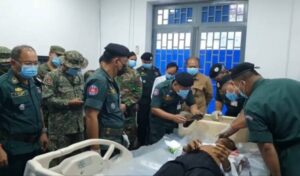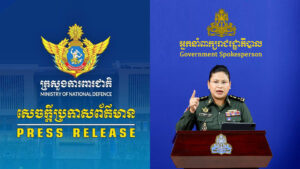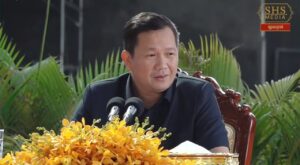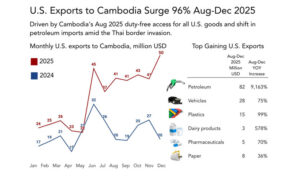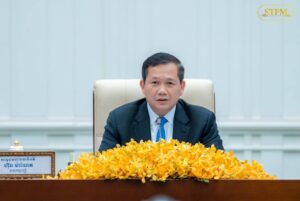(Video) Selected Comments of Samdech Thipadei Hun Manet at the “National Fish Day, July 1, 2025” [Unofficial Translations]
[1]
(1) Increased fish quantity, reasonable price thanks to cooperation in preserving and preventing illegal fishing
If the quantity of fish in rivers and lakes increases, especially fish for food, it means that we have achieved food security […] The increase in fish quantity this year is remarkable. I went to see the fishing trap and saw (that the amounts of fish are abundant) […] (There are) posts on Facebook about the increased quantity of fish and the reasonable price for people to eat. But what is important is that this increase in fish quantity comes from cooperation in preserving and preventing illegal fishing […] Between family fishing (and) commercial fishing for distribution to non-fishermen, it must be done at a level that is appropriate according to the law and that small-scale fishermen can also make a profit. I thank the combined efforts of relevant officers, the armed forces, especially the Royal Cambodian Armed Forces, along with fisheries officers and relevant authorities, whereas encouraging them to continue this work uninterruptedly […] (This is considered a success in) ensuring fish yields in our natural lakes (and rivers) […]
[2]
(2) Peace and win-win politics not only stop fighting but also open up the battlefield crops growing
Food security refers to the ability to provide people with nutritious and sufficient food to ensure their health. This does not come automatically. There are many countries in the world that have food security problems […] Up to now, even in difficult situations, such as the lockdown in the era of COVID-19 and the current border closure by a neighboring country, Cambodia has ensured (its food security). Has Cambodia ever faced a food security problem in the past? We had […] We had had challenges, especially when the country was at war. What happens when there is a war? A lot of land is not used for cultivation. All are under mines and bomb sites. Win-win politics helps us end the war and ensure peace. The Takeo people now, in some places, no longer want to use cows, but only mechanical pulled tractors […] Peace and win-win politics not only stop fighting between and among the Cambodians, but also open up the land that was once a battlefield (for people to grow crops) […] Once the Cambodians (unite) as one, it allows the Cambodians to move everywhere, live wherever they wish to. When people go, economic activity and industry increase […]
(3) Peace is the one important factor in ensuring food security
This (increase of economic activity and industry) is the achievement of peace […] Whether you are satisfied with it or not, you still have to recognize it. We are breathing in the peace atmosphere – the end of war stems from the win-win politics […] If you do not recognize the benefits of peace, you will end up living in a war zone. However, (peace is) everywhere, and with it, ensuring food security that makes us living a better life. One important factor in ensuring food security is peace. On another front, (the government) has a clear policy. The agricultural products are clearly channeling profit into the pockets of the people. During the Pol Pot era, people worked in agriculture, why did they not have sufficient rice to eat? It was because of (wrong) policies […]
(4) In power for many terms, Royal Government continues to favor works in agriculture, build canals and irrigation systems across the country
They exchanged rice for weapons to wage war, not distributed to the people. The government led by the Cambodian People’s Party, since the liberation of 1979, has studied all the formulas and compiled solidarity groups to gather the remaining people together to help each other. Later, it allowed private property for the people and helped give priority to many agricultural sectors, such as not charging taxes on agricultural land, equipment, and agricultural fertilizers […] In power for many terms, from previous terms to this term, the Royal Government has continued to favor the private sector that works in agriculture. We help build canals and irrigation systems across the country […] and work hard to connect and create additional markets, so that Cambodia would not rely on just a particular market […]
(5) We must strengthen capacity to guarantee internal food supplies and certain consumer goods
Powerful countries look down on us, saying that we depend on their markets. Should they close us down, we would die on our own, (so they say) […] But some economies (have received) billions from the Cambodian people. The Royal Government has taken into consideration not only cultivation as agriculture but also fishing, animal husbandry, planting strategic crops such as rubber, various processed foods, and mixed crops to ensure internal food security. We do not close trade with neighboring countries, but we must strengthen our internal capacity to guarantee (own food supplies and consumer goods) […] No country can grow 1,000 different crops or raise 100 animal species on its own, without trading with neighboring countries or foreign countries. But firstly, we need to ensure food security and secondly, supply some products internally instead of importing […] Right now, rice, corn, pork, etc., and we are self-employed and export. We set a goal to create more, reduce imports or replace imports […] on the condition that even if the border is closed and nothing is brought in, we can still feed ourselves […]
(6) Correct policies create security, stability, and peace and turning former bomb sites to agricultural areas with infrastructure and prosperously living population
What is happening now shows that (Cambodia has implemented) the right policies in many areas that have allowed us to succeed ownership in this difficult period. A concrete example here is when there is this border issue. The Royal Government has put forward and implemented policies to strengthen the education sector, the health sector, and invest in physical infrastructure, water, roads, electricity, technology, and the Internet for decades, making the country able to resist threats, whether by armed forces, but especially in the economic sector, such as closing border crossings, stopping sale of fuel, turning off electricity, turning off the Internet […]
What the (Royal) government (of Cambodia) has been doing is investing in its own capabilities so that no one can look down on Cambodia. The right policies have created security, stability, and peace […] connecting between and turning former bomb sites to agricultural areas where there are infrastructures and prosperously living population. The Policy Committee promotes the development of agro-industrial and industrial sectors in the western area of the country, in addition to the Phnom Penh economic pole, Preah Sihanouk province economic pole, and Siem Reap province economic pole […] which includes Battambang, Banteay Meanchey, Pursat, thus opening up the corridor of fish, rice, durian, and tangerine, etc. to China […]
(7) Diversify economy and partners to not rely only on one partner to breath
We continue to strengthen the infrastructure and connectivity. We will not cut off relations with neighboring countries until people stop trading with each other in the future […] but we must diversify the economy and diversify our partners. If there is a problem somewhere, we don’t suffocate, as we don’t rely on only one partner to breath. We must find ways to breathe more than one way ourselves, plus guarantee more partners. This is a strategy to ensure security, market stability […] (However) any difficulties or challenges that do not kill us make us stronger, we are more competent and capable […] By this time, the people believe strongly that Samdech Techo’s decisions in the previous government have not been for any country, but for the interests of our entire nation.
(8) Cambodia remains patient to have anything to do with other’s internal affairs but has been looked down upon
Now Cambodia has the authority to guarantee security, protect national honor, and oppose all kinds of contempt, especially the systematic use of the economy to pressure Cambodia. From the beginning of the mandate and from the beginning of this year, one country has brought the issue of nationalism, the issue of territory, the attack and insults on Cambodia, in order to gain its own reputation […] Cambodia remains patient because it does not want to have anything to do with that country’s internal politics. Ultimately, not speaking up has resulted in being looked down upon, and when we speak up, we are accused of being bad people, of meddling in the internal politics of their country […]
(9) On border crossings – Cambodia is not the one who started the fight, the key is not with Cambodia, and Cambodia never thinks this is a game
On the issue of opening/closing the border crossings. I know that it has affected the national interests and people of both countries, especially regarding traveling, communication, patients passing through […] On June 24, 2025, Cambodia must declare that “if Thailand continues to close (unilaterally) the border crossings, Cambodia will close (all border crossings on its side) until the situation returns to as before June 7.” I am asking the affected Cambodian and Thai citizens to understand. Cambodia is not the one who started the fight, and the key is not in Cambodia. Cambodia never thinks this is a game […]
On June 24, 2025, the Thai Prime Minister announced that the country is closing (the border crossings with Cambodia) […] On the evening of June 25, a spokesperson for the Thai Ministry of Foreign Affairs said that it did not close (the border crossings) […] Cambodia has one voice from top to bottom. Whatever the Cambodian Prime Minister announced, the lower levels would implement it accordingly. If there is a problem, the Prime Minister is responsible […] Cambodia does it this way. The Cambodians are straightforward, do not abandon the rules. Whatever we do, we do it by the book/rules […]
On June 29, 2025, the Thai side announced that it would temporarily allow 50 trucks to enter and exit the country per day, and 20 trucks per day at some crossings […] They admitted that they had sent the letter, and quickly added that Cambodia refused the request […] Suddenly, the Deputy Prime Minister and Minister of National Defense of Thailand said that they had not sent the letter […] Later that evening, there was news that the document was fake, and yesterday, they said that the document was not fake, but leaked […]
Now, who should we consider the one in charge? Shall the Cambodian government follow suit? […] If the trucks were stuck (from a border closure), it would take an instant of border crossing opening and all of them would have left already. Why is it necessary to ask for a permanent permit for 120 trucks to enter and leave a day? It means asking for goods to be traded in and out […] The customs and the Cambodian provinces said that there are no Cambodian trucks stuck on the Thai side, and there are no Thai trucks stuck on the Cambodian side […]
(10) “The amateur met by the pro” … Cambodia is waiting for the real Thai authority on border crossings
This is what they say in Khmer – “the amateur met with the pro”. The Cambodian side is not the one who is saying this […] Cambodia is waiting for the real authority to close and open the border crossings. The one who really opens the crossings. Only when the border crossing is opened to normal can we think about the military negotiation […] Let me inform them that Cambodia has not interfered in the politics of any country. The country should resolve its own politics. Don’t come paintbrush Cambodia […] Cambodia must protect its 17 million people, the dignity and honor of the nation. We had been patient, and as we did not respond, some citizens misunderstood that we were incapable and relied on others to survive. So, our measures are nothing other than protecting the honor, dignity, justice, territorial integrity and the supreme interests of the Cambodian nation […] Our position is to resolve the issues peacefully. We are not backing down from bringing the (four unsettled border points) matter to the ICJ […] We are choosing this (option) because it ensures peace, cooperation, and avoids bloodshed and disputes over unclear places that have been disputed for hundreds of years […]
(11) Cambodia doesn’t brag about weapons, about planning to take any province or city, but says “don’t ever enter our territory”
I don’t want to talk about the border strategy and methods at this point. I’m not bragging about the attacks. Cambodia has not shown off this or that (weapons) in store. At one point, they say they could take Phnom Penh in just three weeks, and at another point, they say that in just five minutes, they could have their fighters up and drop bombs. We don’t need words to retaliate. There is a Chinese war strategy that says let us maintain the “form of water.” Water has no clear form, but if anyone comes in, they will sink. We don’t brag about weapons, we don’t brag about planning to take any province or city, but we say don’t enter our territory.
Please allow me to clarify to His Excellencies the Ambassadors, the Royal Ambassadors, who are present here that Cambodia has never talked about attacking anyone’s city or insulting anyone. We only ask to defend our territory. Samdech Techo stated that “normally in defense strategies, there are counterattacks.” But we have no intention of using armed force to violate anyone’s territory […] Hopefully, the bilateral settlement by JBC could go on, and for the four points, namely the Ta Moan Thom Temple, the Ta Moan Toch Temple, the Ta Krabey Temple, and the Mom Bei area, must be brought to ICJ for settlement […]
(12) No GBC meeting and no RBC meeting if there is no opening of border to normalcy
I would like to announce that the Ta Moan Thom area, Ta Moan Toch, Ta Krabey, Mom Bei are undefined areas. We will go to the international court to resolve it. No one has the right to unilaterally declare that place closed, or stop anyone from entering, but maintain the status quo. Should they dare to prohibit access unilaterally to prevent Cambodian people from entering, that would clearly be the red line […] If Thailand takes that place, based on the unilateral map, it means that the Thai unilaterally drawn 1/50000 map is recognized. In that case, would there be any other places along the 800-kilometer some border that Thailand has drawn in? It is unacceptable. We must comply with the 2000 MOU, the 1904 French-Siamese Convention, and the original map of 1907, whether it is 1/50,000, 1/100,000, etc., as the important point is to transfer the original map accurately to the ground. Cambodia is waiting to see who really wants to resolve it […] “There will be no GBC meeting led by the Minister of National Defense, no RBC meeting led by the Cambodian-Thai military region, if there is no opening of the border to normalcy” […] Cambodia has no time to waste. We want authenticity […] Cambodia needs to take clear ownership […]
(13) Thanks everyone for supporting troops and Royal Government in efforts to protect territorial integrity, sovereignty and honor of the nation
Please allow me to thank the Ministry of Interior, the Immigration Department, all institutions of the seven border provinces, the Ministry of Labor who cooperated to help the workers’ return […] I thank those provinces at the border for helping arrange the transport for them […] Let me thank armed forces in military regions 3, 5, and 4 […] the June 18 march, with more than 150,000 young people, in support of the Royal Government and the frontline troops […] the citizens across the country who provided all kinds of support, including funds, food, and encouragement via social media […] and the families of the soldiers and the displaced people […] I thank two other frontline troops, the Cambodia-Thailand Joint Border Committee (JBC), the Border Working Group, and the Diplomatic and Legal Working Group […] the Information Working Group, which led the explanation and responded publicly to various accusations […] Spokespersons of the Ministry of National Defense, the Ministry of Interior who worked together to protect the integrity of the nation […] and many thanks to the citizens and the private sector who showed their support for our troops and the Royal Government in taking measures to prepare for the protection of the territorial integrity as well as sovereignty and honor of the nation […]
(14) Let us keep up the nationalist spirit of Cambodians help Cambodian products forever
However, short-term help is not enough. We need to think of a long-term strategy. I have already instructed the Policy Committee, the Ministry of Agriculture (Forestry and Fisheries) in particular, and Trade to examine the gradual approach to the production of certain products […] We must continue to promote agroindustry, in addition to the establishment of special economic zones in the western part of the country, to promote the innovation of agricultural products there in order to export to more markets around the world, in way of diversifying the economy […] The government only helps create and connect, but if the Cambodian customers do not buy, the market will not grow.
If our people buy, the money will be used by companies to increase production, improve quality even more. So, let us keep up the nationalist spirit at this time so that the Cambodians can help Cambodian products forever […] The relevant ministries connect to the market system, wholesale, retail, etc., by turning wholesalers from abroad to wholesalers locally, in order to reduce imports, help support local products, create jobs, and ensure income for the people and the private sector in our region, whether it is food, agricultural products, or handicrafts. May the spirit of unity among the people, customers, the private sector, and the state continue to move forward in the spirit of patriotism, the spirit of the Cambodians help the Cambodians, the spirit of the Cambodians support the Cambodian products, so that we can strengthen our internal capabilities […]
(15) In countries, most people rent houses for life … in Cambodia land is distributed to those without it
(As part of the “Give Land to Protect Forest” policy, we have put in place a 5-hour lottery for people who are truly landless. There are more than 10,000 applicants. In step 1, we set up 500 locations in Stung Treng. We do it transparently. Draw the lottery live. If you win, the name of the person who got the land will show, and the land is real. This is a solution to the land rights of the people. In the world, even rich countries, there may not be a policy of distributing land to the people. Some countries have it, but not all countries do. In some rich countries, people do not have land. They rent their houses for life. In Cambodia, if you don’t have a house, we distribute land to you. We give land to those who are truly landless […]

